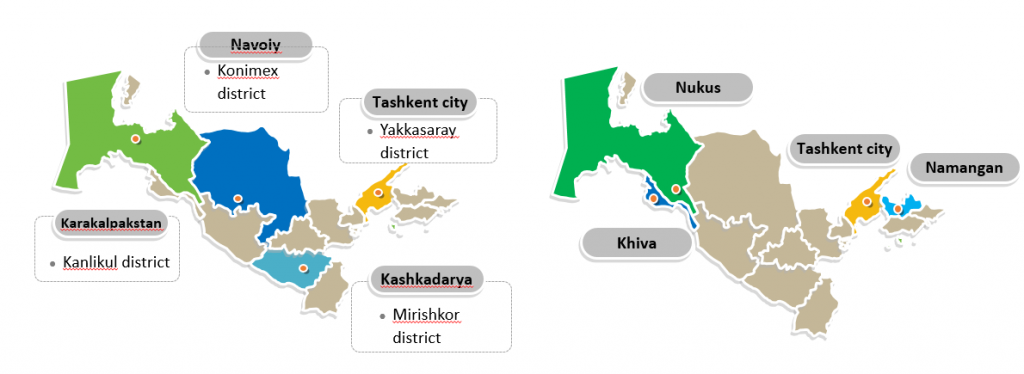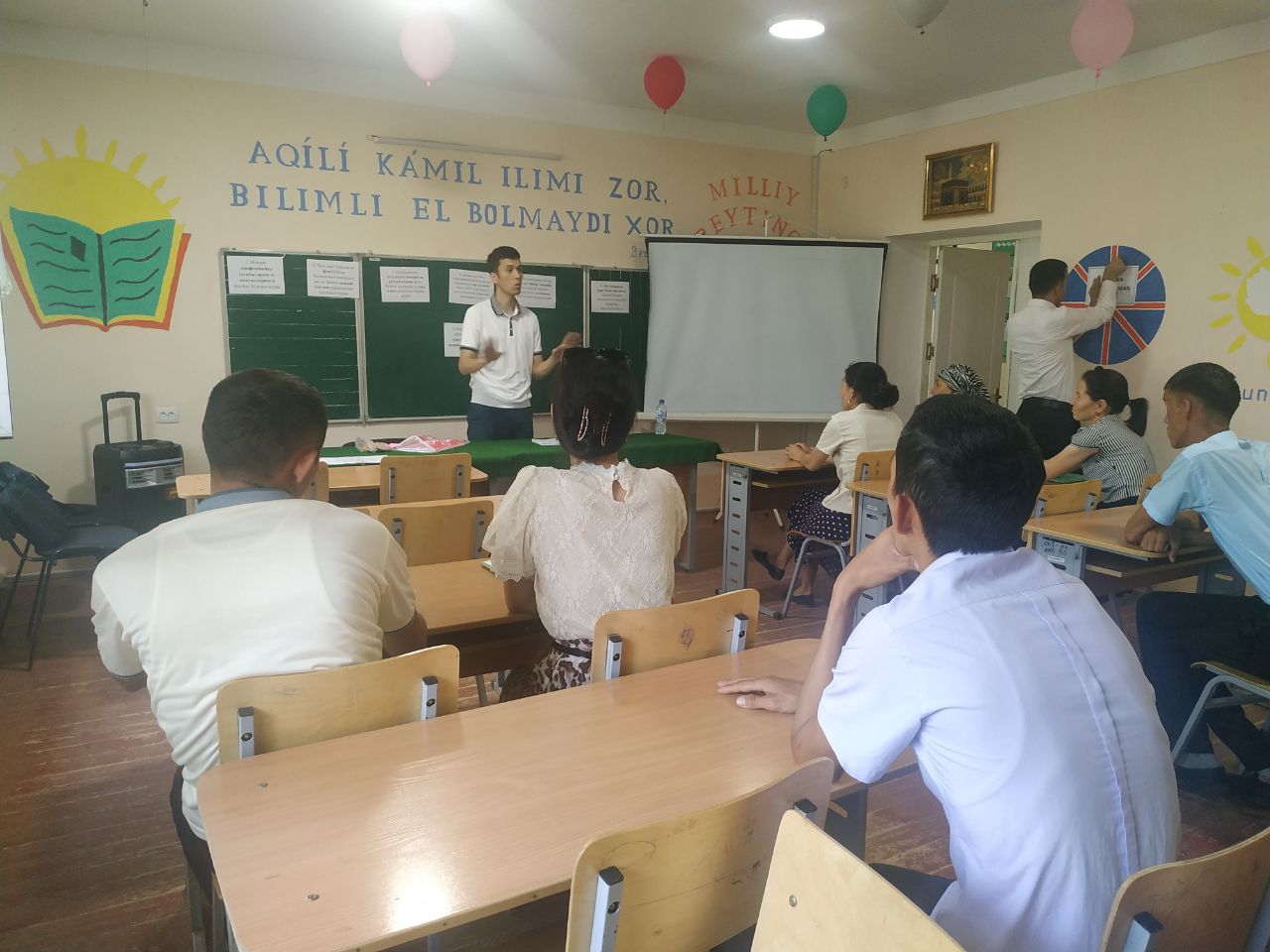Quality of education is directly linked with teacher professional development (TPD). To improve learning outcomes and results, governments must invest in TPD and enhance teachers’ capacity by equipping them with up-to-date pedagogical skills. Similar to many countries in the region, Uzbekistan has recognized the scale and the urgency of the challenges facing their TPD systems, and has introduced two new continuous professional development models, supported by UNESCO.
The Global Partnership for Education Knowledge and Innovation Exchange (GPE KIX) in partnership with UNESCO, is implementing the project, “Adapting and Scaling Teacher Professional Development Approaches in Ghana, Honduras and Uzbekistan”, within which two TPD Models are being developed, tested, and adapted into the education system of Uzbekistan. These new TPD models aim to improve the equity of access of teachers to in-service trainings, as well as to overcome major challenges in the education system that were exacerbated by COVID-19.
Within this project, the existing assessment practices, curricula, and the national standards of teachers’ qualification system, particularly pedagogical, technological, organizational factors, were scrutinized so to evaluate the impact on the inclusivity, quality, and efficiency of TPD. Through a comprehensive needs analysis, teachers’ ICT readiness, and the various professional development needs of different subgroups of teachers were identified, and major issues and gaps in the traditional TPD model were spotted.
The previous model allowed teachers to get their in-service training once in five years, enabling them to enhance mostly subject-based knowledge and pedagogical skills. However, classroom application, and teachers’ learning preferences and competencies were not addressed or monitored.
According to Ayubkhon Radjiyev, rector of the National Research Institute named after Avloni of the Ministry of Public Education of Uzbekistan, “Uzbekistan has long relied on the same tried-and-tested professional development model for the last 30 years. However, this so-called “plan-based model” has become unreliable in meeting the needs of schoolteachers for professional development, caused by the rapid development of technology, and demands and expectations for schools. The new model gives on-time access to emerging teaching methodologies, and incentivizes informal peer-learning communities, which are fundamental to teachers learning from others’ experiences.”
The two TPD Models of Uzbekistan cover following segments of the education system:
- Model for teachers of the public education sector (primary and secondary education K11), and
- Model for teachers of creative, gifted, and special needs children
The project has also supported the strengthening of the learning management platforms (https://onlinedu.uz/ and https://edu.piima.uz/), as integral parts of the TPD models of Uzbekistan. These platforms help expand professional learning communities (PLC), where teachers reflect and assess their knowledge, and distance learning opportunities, where teachers can learn any relevant topics for their professional development anytime and anywhere.
UNESCO is working to analyse the sustainability and scalability of the two models through comprehensive field research in six different regions, with a participation of a total of 250 different subgroups of teachers. Pilot schools and research participants were selected considering gender, social and economic factors, and geographic representation, in order to adequately study and represent the needs and TPD experiences of teachers in different subgroups, and address equity, quality and inclusion issues in their professional development.
Model for teachers of the public education sector (primary and secondary education, K11)
In four regions (six schools in each district, covering more than 184 participants: teachers, methodologists, and school principals)
Model for teachers of creative, gifted, and special needs children
In four regions (two schools in each district, covering more than 64 participants: teachers, methodologists, and school principals)

“Recent changes in education provision caused by COVID-19 and shifting to online modes for teaching and learning, have created new challenges for teachers; inequality and the digital divide among teachers further widened. In this sense, TPD models should respond to not only emerging challenges and disruptions, but also future emergencies and problems. Developing and enhancing TPD approaches is more than urgent in many countries. On this note, the project launched and supported teachers quite timely and effectively”, says Bakhtiyor Namazov, National education specialist of UNESCO Tashkent Office.
UNESCO Tashkent Office Field Test-2 process in Konimex district of Navoiy region.


66 Responses
When someone writes an paragraph he/she keeps the thought of a user Creative jewelry advertising photography in Hyderabad his/her mind that how a usercan understand it. Thus that’s why this post is outstdanding.Thanks!
tamoxifenworld tamoxifen – tamoxifen for sale
online ed medications ed medication onlinebest treatment for ed
Hey, thanks for the blog article.Thanks Again. Awesome.
overcoming ed erectile dysfunction treatments – natural herbs for ed
Thanks a lot for the blog post. Cool.
Looking forward to reading more. Great blog article.Thanks Again. Really Great.
trustworthy canadian pharmacy which canadian pharmacy is legitimate
CPD,ICF,UKCP AND BACP accredited qualified staff members
It’s actually a cool and helpful piece of information. I am happy that you just shared this helpful information with us.Please keep us informed like this. Thanks for sharing.
Fantastic post.Really thank you! Keep writing.
Thank you for your blog post.Really thank you! Great.
I truly appreciate this blog article.Really thank you!
Im thankful for the blog article.Much thanks again. Really Great.
Identified as the ‘big three” betting alternatives, moneylines,game totals and point spreads are presented on most sporting events.
I have read so many content on the topic of the blogger lovers but this paragraph is genuinely a pleasant piece of writing, keep it up.
I loved your blog.Really looking forward to read more.
What’s up friends, fastidious post and pleasant argumentscommented here, I am in fact enjoying by these.
Hi there! I’m at work browsing your blog from my new iphone 4!Just wanted to say I love reading through your blog and look forward to all your posts!Keep up the great work!Also visit my blog bella-dee
Pay for my esl creative essay cashnetusaUYhjhgTDkJHVy
ventolin over the counter singapore: ventolin – ventolin tablets australiaventolin 200 mcg
Acheter Du Clomid En Ligne Grossesses Multiples
Awesome blog.Really looking forward to read more. Much obliged.
Great, thanks for sharing this blog.Really looking forward to read more. Fantastic.
Fantastic blog post.Really thank you! Fantastic.
Wow, great article.Really looking forward to read more. Great.
I really enjoy the blog post.Thanks Again. Want more.
I really liked your post. Want more.
Say, you got a nice article post.Really looking forward to read more. Cool.
I value the article.Really thank you! Fantastic.
Major thanks for the article.Really thank you! Fantastic.
Very neat article.Really thank you! Really Cool.
Wow, great blog article.Much thanks again.
I really like and appreciate your blog post.Really looking forward to read more. Really Great.
Looking forward to reading more. Great article.Thanks Again. Much obliged.
Thanks-a-mundo for the blog post.Really thank you! Cool.
Thank you for your article post.Really looking forward to read more. Really Cool.
Say, you got a nice blog article.Thanks Again. Fantastic.
Im grateful for the blog.Really looking forward to read more. Keep writing.
Really enjoyed this blog. Will read on…
I cannot thank you enough for the post.Much thanks again. Keep writing.
I appreciate you sharing this article.Thanks Again. Will read on…
Nice post. I study something more challenging on completely different blogs everyday. It should always be stimulating to read content material from other writers and practice a bit something from their store. I’d want to use some with the content material on my weblog whether you don’t mind. Natually I’ll offer you a link on your internet blog. Thanks for sharing.
I really like and appreciate your article.Thanks Again. Will read on…
Your positive energy is contagious, and it radiates through your writing.
Your literary opus reverberates with a resounding profundity, leaving an indelible imprint upon the discerning minds that wander into the boundless realms of your exalted blog, where erudition reigns supreme.
Thank you for the time and dedication you invest in creating valuable content for your readers.
Your blog is an inspiration for those seeking personal growth and self-improvement.
Very informative article.Thanks Again. Really Great.
Thanks for sharing, this is a fantastic blog post. Cool.
Awesome post.Really thank you! Awesome.
I appreciate you sharing this blog post.Really looking forward to read more. Want more.
I truly appreciate this blog article.Much thanks again. Cool.
Awesome blog article.Really looking forward to read more. Want more.
Thank you for your article post.Really looking forward to read more. Really Great.
Hey, thanks for the post.Much thanks again. Cool.
Appreciate you sharing, great article.Really thank you! Really Cool.
Really enjoyed this blog post. Awesome.
I cannot thank you enough for the post.Much thanks again. Will read on…
I really enjoy the article.Really looking forward to read more. Want more.
Really enjoyed this article.Really looking forward to read more. Awesome.
I think this is a real great article.Really thank you! Awesome.
Major thanks for the blog.Thanks Again. Much obliged.
I cannot thank you enough for the article.Really thank you! Really Great.
I really liked your article.Thanks Again. Fantastic.
Great, thanks for sharing this post.Thanks Again. Want more.